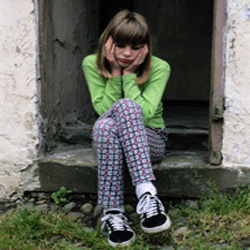Is it moodiness or is it depression?

Depression in children and teenagers can be very debilitating and can have a lifelong impact. Parents who suspect their child, even their youngster, might be depressed should seek help right away rather than simply hope their child will eventually “grow out of it.”
“Today, we are seeing the onset of depression at an earlier and earlier age, and the severity has increased,” says Dr. Lila Amirali, psychiatrist at The Montreal Children’s Hospital of the McGill University Health Centre. She encourages parents who suspect their child might be suffering from depression to have them assessed right away by a health professional at their local CLSC.
Dr. Amirali says about one in 100 youngsters (under the age of 13) and about four in 100 teenagers suffer from depression (compared to about 10 in 100 adults). Symptoms usually appear after the child has suffered a traumatic event such as parents’ divorce, death of a family member, or a break-up with a boyfriend or girlfriend. When there is a family history of depression, children are more vulnerable to developing this mood disorder.
Dr. Amirali admits that diagnosing depression in children is tricky. But when any of the behaviours listed below are present for more than two weeks, parents should take notice. If you suspect depression, the first step is to ask your child how he is feeling. If the response is “sad” or “hopeless”, make an appointment at your local CLSC.
Symptoms of depression in children and teens:
- Depressed mood or irritability
- Loss of interest in activities they previously enjoyed
- Extremely bored
- Disturbed sleep patterns (sleeping more or less than usual)
- Lack of energy
- Loss of appetite
- Isolation, withdrawal from friends
- Cry easily and for no apparent reason / difficulty concentrating / excessive guilt
- Spontaneously express dark thoughts, such as talk of suicide
“If your child talks about wanting to commit suicide don’t brush it off, says Dr. Amirali. “Take them to an emergency room immediately.”
“Left untreated, depression in children and teens will eventually pass, but it will take a very long time – sometimes a year or more,” says Dr. Amirali. “It is unfair to let depression taint a child’s outlook on life during their formative years. Also, studies show when a child’s depression goes untreated, he has a 50-50 chance of suffering a relapse within five to 10 years and may also be prone to developing some other form of mental illness such an eating disorder, substance abuse, conduct disorder or anxiety disorder.”
The first course of action to help children overcome depression is therapy, according to Dr. Amirali. Methods that have proven very effective include cognitive behaviour therapy (children are taught to question the validity of their negative thoughts); interpersonal therapy (children are taught how to develop better interpersonal relationships); psychodynamic therapy (children are help with their personality development and their ability to deal with conflict). In addition to therapy, some children might be prescribed selective serotonin reuptake inhibitors (SSRIs or other antidepressants), although Dr. Amirali says these very useful medications are deemed overall less effective in children than in adults. The bottom line is “yes”, children and teens can suffer depression, but there are some very effective treatments to help them overcome this mood disorder and cope better in the future.
Dr. Lila Amirali will be giving a lecture on children, teens and depression during the 2010 Mini Med at the MCH. To register for this five-part lecture series (in French or English) go to: www.thechildren.com
To listen to Dr. Amirali describe the signs of depression in children and teens please click on the following link: www.thechildren.com
To listen to Dr. Amirali describe the signs of depression in children and teens please click on the following link: http://www.youtube.com/watch?v=8vxlf8Uec7U
-30-
For more information or to arrange an interview with Dr. Amirali please contact:
Lisa Dutton
Manager
Public Relations and Communications
Public Relations and Communications
The Montreal Children’s Hospital of the MUHC 514-412-4307


